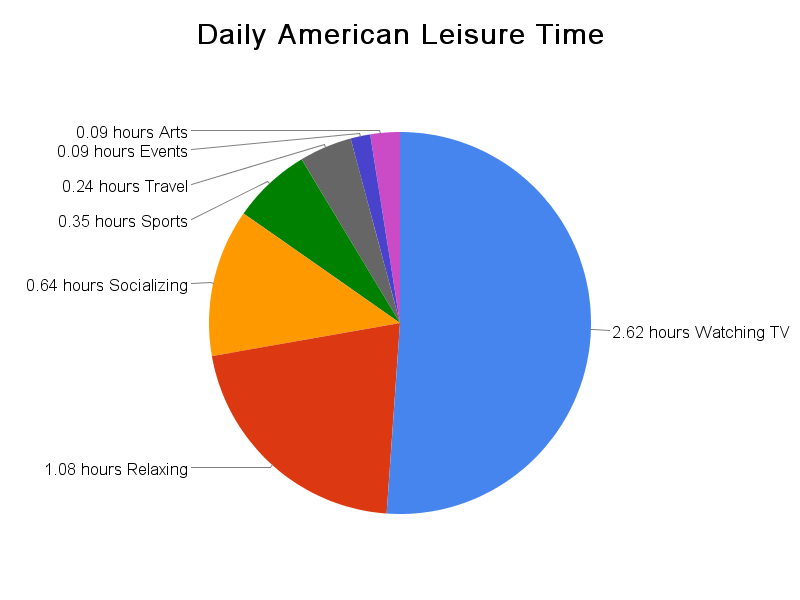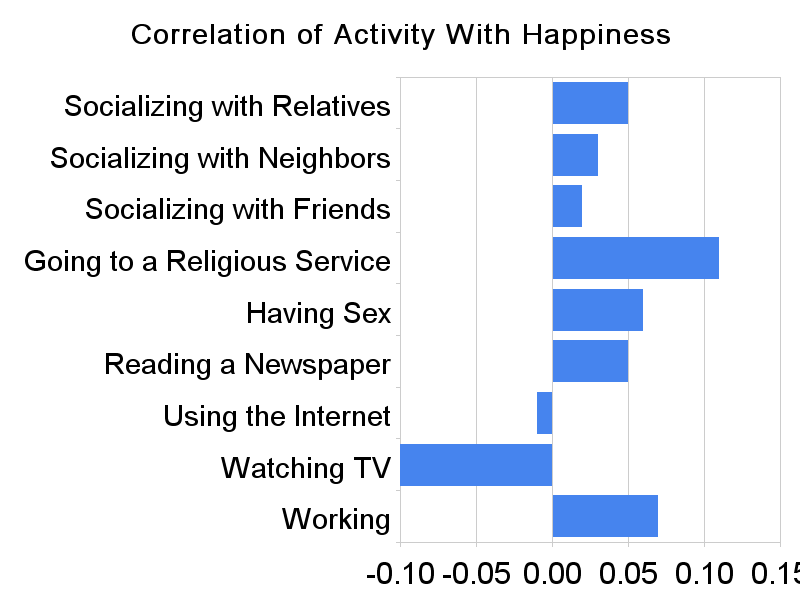November 15, 2008Twenty Eight HoursThere is a bottom-up solution to the economic meltdown that is woven in each of our daily lives - most of us have a much larger cushion than we think. Us ordinary people have thousands of dollars of free value in a hidden account we can tap every month. The total amount of pent-up capital is enormous, and if everybody were to unlock it worldwide, I am convinced we would easily inject enough extra liquidity in the world economy to end the depression. Tapping this resource is a personal choice and does not require a government handout or a PhD. Withdrawals will not tie you into long-term obligations. And although spending your savings may change your life, studies have shown it will make you happier and healthier in the long run. To do it, all you need is a TV and enough imagination to figure out how to spend twenty eight hours of leisure. Living The Good Life In One Easy Step To save the economy, throw out your TV. Here are some charts on the breakdown of the average American day. We live in a leisure society where most of us have a few hours each day that not consumed by work, sleep, food, school, or chores. The average amount of leisure time in the American day is 5.11 hours. If you are like me, you do not feel like you have 5 free hours every day. But it really is true on average. Here is where all the time goes:  We spend an average of 2.62 hours every day watching TV according to the Bureau of Labor and Statistics. The TV experts at Nielsen are better at tracking VCRs and TV websites and other forms of TV, and they say that the BLS has it all wrong. Their best estimates place viewing time at a bit over four hours per day, about 28 hours per week. Television-watching is our single most time-consuming activity after work and sleep. And yet do you think Richard Branson loses four hours a day to TV-watching? The rich and famous live a life of leisure, but not a life of TV. To upgrade your life in one easy step, unplug your TV. Thinking About Our TV When I mentioned to my neighbor (Tom Sander) that I was thinking about making the plunge and buying our family's first flat-screen TV, he urged me "don't do it!" See, last year we gave away two of our TVs, leaving our family with one old TV in the attic (it is a once-treasured 1989 Trinitron from college that currently serves the Wii). I almost missed the presidential debates as I ran around trying to figure out how to get a working signal on the tube. Our non-TV life has been busy and uneventful: the main thing I have noticed is that the house is blissfully quiet, without that infernal commercial noise in the background. I sometimes miss TV-watching. I have noticed that without a TV I have no contact with what is being advertised on TV: I never know what movies are playing. So when I considered re-entering the TV-watching world, Tom pointed out academic research that suggests there are good personal reasons to avoid TV. Intuitively I can tell that he is right - my non-TV life seems more tranquil than my previous TV-life. But I have kids that take up all my time and lots of stuff going on, so it is hard for me to tell what sort of difference a TV makes. I am not sure I would watch much TV anyway. But the research floored me. The numbers have convinced me to avoid a new TV, to train my kids to spurn TV, and to tell everybody, if you have one, you should get rid of yours. Televisions not a minor economic problem like illegal drugs or shoplifting: they are an economic abomination. Televisions are a massive failure of the economist's Rational Man model. They are machines that lure us to spend time the bulk of our free time in a way that that makes us obviously, starkly, unhappy. Rational Man's Blind Spot Here is what research says: People like watching TV. Survey ratings suggest that TV beats hobbies, exercise, and baby care on the scale of enjoyable activities, though it's not as enjoyable as socializing, sleep, or sex. On the enjoyment scale, TV is about on par with reading. Modern free markets are built on the basic assumption that people like to do the things that make them happier. People are good at looking after their own well-being, at least for today's things. That's why consumers do so well at deciding how to spend their time and money. For the most part, when researchers double-check this assumption, it is true. People who spend more hours on enjoyable activities are generally happier. Sleep more, socialize more, have more sex - it all seems to make you happier. People who are idle are generally less happy than busy people.  TV watching is the huge exception. The more daily hours of TV you watch, the more unhappy you are. Internet use is also negatively correlated, but only weakly so. Newspaper reading is positively correlated with happiness. People's desire to watch TV is a massively irrational act. Somehow, we all enjoy watching TV, we spend the bulk of our leisure time doing it, and yet it makes us remarkably unhappy. A Recession Resolution So my suggestion for Sunday morning is this: turn off the TV, step away from the internet, and go take a walk to get a newspaper. Then go through your mail and cancel your cable subscription. Refuse to let your kids watch TV. Refuse to upgrade your TV for the February 17 analog shutoff. Reclaim your twenty-eight hours next week. You will all be happier. And the economy will recover. Posted by David at November 15, 2008 03:42 PMComments
Post a comment
|
| Copyright 2008 © David Bau. All Rights Reserved. |